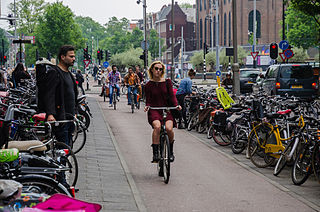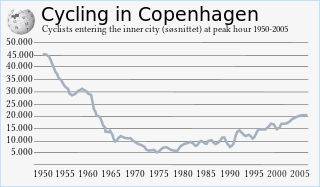
Cycling, also called bicycling or biking, is the use of bicycles for transport, recreation, exercise or sport. People engaged in cycling are referred to as "cyclists", "bicyclists", or "bikers". Apart from two-wheeled bicycles, "cycling" also includes the riding of unicycles, tricycles, quadricycles, recumbent and similar human-powered vehicles (HPVs).

Utility cycling encompasses any cycling done simply as a means of transport rather than as a sport or leisure activity. It is the original and most common type of cycling in the world.

Mikael Colville-Andersen is a Canadian-Danish urban designer and urban mobility expert. He was the CEO of Copenhagenize Design Company, which he founded in 2009 in Copenhagen, and he works with cities and governments around the world in coaching them towards becoming more bicycle friendly. He is the host of the urbanism documentary television series The Life-Sized City, which premiered in 2017 on TVOntario and in 2018 on various other international channels including Finland's national broadcaster YLE and Italian broadcaster La Effe. Season 1 of The Life-Sized City was nominated for five Canadian Screen Awards in 2018.

EuroVelo is a network of currently 17 long-distance cycling routes criss-crossing Europe, in various stages of completion. When completed, the EuroVelo network's total length will almost be 90,000 km (55,923 mi). As of November 2019 more than 45,000 km (27,962 mi) were in place. EuroVelo is a project of the European Cyclists' Federation (ECF).

Bicycle culture can refer to a mainstream culture that supports the use of bicycles or to a subculture. Although "bike culture" is often used to refer to various forms of associated fashion, it is erroneous to call fashion in and of itself a culture.

Cycling in Melbourne, the capital city of Victoria, Australia, is enhanced by the city's relatively flat topography and generally mild climate. The city has an active cycling culture for commuting, recreation, fitness and sport, and the metropolitan area has an extensive network of off-road bicycle paths, as well as designated bicycle lanes on many streets.

A cycling club is a society for cyclists. Clubs tend to be mostly local, and can be general or specialised. In the United Kingdom, for example, the Cyclists' Touring Club, (CTC) is a national cycling association; the Tricycle Association, Tandem Club and the Veterans Time Trial Association, for those over 40, are specialist clubs. Members of specialist or national groups often also belong to local clubs.

The European Cyclists' Federation (ECF) is a non-profit member-based umbrella federation of local, regional and national civil society organizations that promote cycling for both transportation and leisure.

Cycling advocacy consists of activities that call for, promote or enable increased adoption and support for cycling and improved safety and convenience for cyclists, usually within urbanized areas or semi-urban regions. Issues of concern typically include policy, administrative and legal changes ; advocating and establishing better cycling infrastructure ; public education regarding the health, transportational and environmental benefits of cycling for both individuals and communities, cycling and motoring skills; and increasing public and political support for bicycling.

Velo-city is a series of cycle planning conferences that started in 1980 in Bremen. The name Velo-city is a small play on word using the French for bicycle – vélo, and Velo-city can also be read as velocity or speed. European Cyclists’ Federation owns the series name, and the ECF Board is the decision-making body for Velo-city.

Cycling in New Zealand, while relatively popular as a sport, is a very marginal commuting mode, with the share hovering around 1–3% in most major cities. This is due to a number of factors, principally safety fears.

Active mobility, soft mobility, active travel, active transport or active transportation is the transport of people or goods, through non-motorized means, based around human physical activity. The best-known forms of active mobility are walking and cycling, though other modes include running, rowing, skateboarding, kick scooters and roller skates. Due to its prevalence, cycling is sometimes considered separately from the other forms of active mobility.
The Cycling Embassy of Denmark (CED) is a Danish network organization dedicated to the promotion of cycling as a means of transportation and Denmark as a cycling nation by capitalizing on the deep rooted Danish cycling culture to offer solutions to urban planners across Europe and the world in the areas of urban planning, bicycle infrastructure development, and cycling promotion.

Cycling infrastructure refers to all infrastructure permissible for use by cyclists, including the network of roads and streets used by motorists, except where cyclists are excluded, along with bikeways from which motor vehicles are excluded – including bike paths, bike lanes, cycle tracks, rail trails and, where permitted, sidewalks. Cycling infrastructure also includes amenities such as bike racks for parking, shelters, service centers and specialized traffic signs and signals. Cycling modal share is strongly associated with the size of local cycling infrastructure.

Pedro Roberto Kanof is an Italian engineer and inventor. He ideated the first electronic system and method for renting bicycles in the 1980s, the same method that is now used globally in the bicycle sharing system.

Controversies have surrounded bikeways, particularly in North America and the United Kingdom and specifically between those who prefer to focus on education rather than separated cycling infrastructure and those who prefer to create dedicated facilities to make cyclists safer and make it more inviting to a wider public. Other dissenters say safety is better served by using the road space for parking.

Cycling is one of the various types of private transport and a major part of individual mobility. Cycling has been considered
[in] economic and social terms, [influencing] or [impacting] upon transport, mobility, environment and climate change, the economy and tourism. ... As a means of transport over short distances, cycling brings certain economic, environmental and health-related benefits.

Cycling in the United States is a minor sport in the country. It is also a mode of transport, particularly in urban areas.

I BIKE Dublin is an advocacy group founded in Dublin, Ireland in 2017 and is focused on improving conditions for cycling in Dublin city. The group carries out direct actions to raise awareness of the issues facing people who cycle in Dublin and to pressure the authorities to do more to provide safe conditions for cycling.

Bicycle counters are electronic devices that detect the number of bicycles at a location for a certain period of time. Some advanced counters can also detect the speed, direction and type of bicycles. These systems are sometimes referred to as bicycle barometers, but the term is misleading because it indicates the measurement of pressure. Most counting stations only consist of sensors, the internal computing device, and some use a display to show the total number of cyclists of the day and the current year. There are counting stations all over the world in over hundreds of cities, for example in Manchester, Zagreb, or in Portland. The first bicycle counting station was installed in Odense, Denmark, in 2002.




















